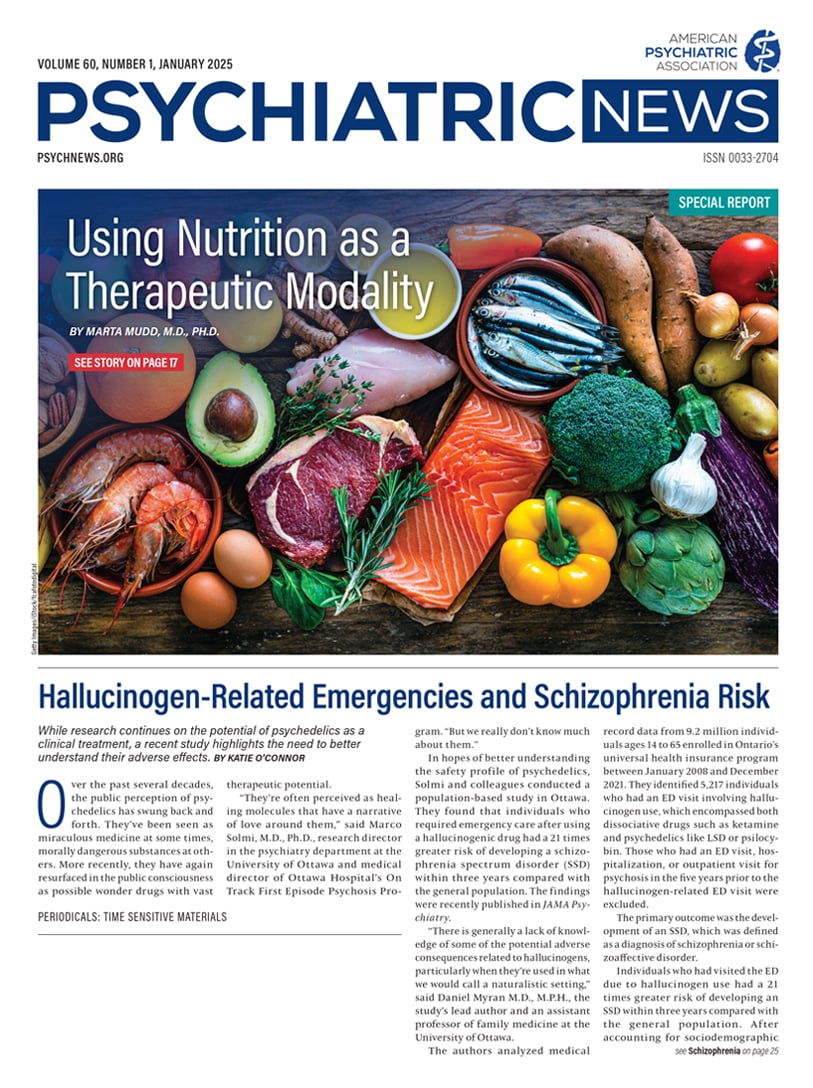Welcome to Psychiatric News’ new section focused on advocacy and policy. We want to make advocacy feel more accessible and actionable by empowering you with the tools and knowledge to become a more effective physician advocate. Our goals are to help keep you up to date on key advocacy topics, help you develop and enhance your advocacy skills, and motivate you to integrate advocacy into your professional life—whether you are a resident, early-career psychiatrist, or long-time practitioner.
In each installment of “Voices in Advocacy & Policy,” you will find relevant, impactful content about advocacy and policy. That could mean an interview with a policy expert, personal advocacy stories, or practical updates about a key issue. We also plan to launch a regular advice column, “Dear Dr. Advocacy,” in which we will answer questions about any aspect of advocacy and policy as it relates to psychiatry and mental health. Send your advocacy and policy questions to
[email protected] under the subject line “Dr. Advocacy”; while your name will not be published, please be sure to include the state in which you work.
Meet the Co-Editors
As the section’s co-editors, we would like to introduce ourselves.
From Dr. Rimal Bera: I am a clinical professor of psychiatry at the University of California, Irvine, where I have been a full-time faculty since 1991. From my earliest years, I have always been interested in advocacy, politics, and making the world a better place. No question that is what directed me into a career in psychiatry, and I feel most blessed to be part of all the changes that have taken place within mental health over those years.
Throughout my career, I have been fortunate to work with so many outstanding people who have dedicated their lives to the improvement of people who suffer from mental illness. It is with that foundation that I am so excited to serve with Kiki Kennedy as a co-editor of this new section. I am excited to hear from readers about what concerns them the most and look forward to helping educate—and hopefully influence—the decision makers who can improve the lives of us as practitioners and the people we serve.
From Dr. Kiki Kennedy: I am a clinical professor of psychiatry at Yale School of Medicine, where I lead the Legislative Advocacy Program and serve as co-chair for the advocacy track in the Social Justice Health Equity Curriculum. I also chair the Legislative Committee for the Connecticut Psychiatric Society, am the immediate past chair of APA’s Council on Advocacy and Government Relations, and co-edited the 2020 book “A Psychiatrist’s Guide to Advocacy.”
I got my start in advocacy more than 20 years ago as an environmental advocate, when I helped mobilize a diverse coalition of community stakeholders to stop the construction of a federally approved interstate natural-gas pipeline. Our advocacy garnered attention from local, state, and federal leaders, including the Connecticut attorney general, who took the pipeline corporation to court—and we actually won! The pipeline was never built. That experience opened my eyes to the incredible power of advocacy and how, by working together, we can make a difference. I’m delighted to be collaborating with Rimal Bera, and I hope that this section will inspire you to take the next step in your own advocacy journey.
Physician Advocacy and Political Speech
We believe that, as a profession, psychiatry faces many complex structural and systemic challenges that create health disparities and threaten our ability to provide quality care for our patients. Advocacy by psychiatrists is essential to effectively address these challenges, whether that means addressing the social determinants of mental health, enforcing mental health parity, or increasing access to high-quality mental health care. We need to advocate at the institutional, community, local, state, and federal levels if we want to help advance the mental health of our patients and their communities.
We would also like to offer a note about physician advocacy and politics: We do not consider physician advocacy to be the same thing as political speech. This can be confusing, because society often politicizes the issues we focus on, and the people before whom we advocate often hold political office.
How is physician advocacy different from political speech? First, in physician advocacy, patients and their communities are the focus and priority, whereas political speech can wholly benefit the speaker. Second, physician advocacy requires that evidence and data are used to support any assertions; political speech has no such expectations and can be based entirely on personal opinion. Third, physician advocacy must take a bipartisan approach in order to effect long-term change, whereas political speech has no such expectation.
We believe that each of us must learn how to advocate both within our party of choice and across the aisle; we cannot shrink from speaking to someone who may hail from a different political party. It is this essence of listening and learning from others that is truly the foundation of our advocacy work as psychiatrists. ■

